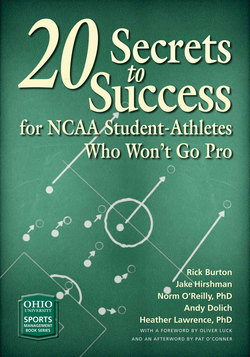Читать книгу 20 Secrets to Success for NCAA Student-Athletes Who Won’t Go Pro - Rick Burton - Страница 7
На сайте Литреса книга снята с продажи.
ОглавлениеForeword
We are human; therefore, we make mistakes—all of us. But what sets us apart is acknowledging the mistake and correcting it. I learned this lesson while participating in intercollegiate athletics, and it has served me well in the rough-and-tumble world of business.
Let me share with you my biggest mistake in my career in the professional sports business and how my boss helped me quickly rectify it.
In the waning months of 2005, the Anschutz Entertainment Group (AEG), owner of the San Jose Earthquakes—one of the founding members of Major League Soccer—decided to relocate the franchise to Houston. I was offered the position of president/general manager of the franchise and on New Year’s Day in 2006 my tenure began.
Of course, there were dozens of tasks in front of us—hiring a staff, finding office space, negotiating a stadium lease, identifying a practice facility, relocating players and coaches, securing sponsorships, selling season tickets. The list was endless and we had only a few weeks before the opening match.
Naturally, the most pressing issue was deciding on the team name. After conducting just a handful of meetings with local soccer officials as well as the MLS office, we decided—in a nod to the European tradition of naming clubs after the year in which they were founded (think Schalke 04 or Hannover 96)—to name the new club Houston 1836, which was the year the City of Houston was established by charter.
Almost immediately there was negative feedback bordering on outrage. Why? Well, 1836 was “annus horribilis” in the eyes of a sizable portion of the Houston community. Three significant military battles took place that year—Alamo, Goliad, and San Jacinto. And in that last battle, which was fought just outside what is now Houston, General Sam Houston defeated General Santa Anna and Mexico lost its province of Texas.
Very quickly I realized that our brand new franchise had a problem. Unintentionally, we had just insulted a hugely important demographic—the Hispanic fan of Mexican descent—by rolling out the team name without a proper vetting. A week or so into this imbroglio, my cell phone rang.
It was Phil Anschutz, owner of AEG, my boss, and a man of few words. He wanted to know my assessment of the situation. I told him it was serious. He pushed back a bit, saying “my folks in Los Angeles (AEG executives) think this will blow over and that the team can ride it out.” “No,” I responded, “it won’t. This is like a burr under the saddle and it will only get worse.” There were a few seconds of silence, then Phil said matter-of-factly, “Well, change the name.”
Mr. Anshutz, a man I had not yet met, trusted in me, and his decisiveness allowed us to cut our losses, rectify the error, and return to promoting the team and the inaugural season. And that inaugural season ended with a bang—the Houston Dynamo as MLS Cup Champions!
In this book, you will read about how being a student-athlete teaches you how to recognize your mistakes and correct them. Being a student-athlete also gives you the skill set to manage and prioritize time demands. Like most student-athletes, you will go pro in something other than sport. This experience truly equips you for life after sport in your career, family, and personal growth.
There are several anecdotes in this book about the value of being a student-athlete and playing intercollegiate athletics. In my case, I would not have had my career opportunities if sport had not been part of my early foundation. Transitioning into the business world was as fundamental as playing college football. It gave me the confidence, determination, and spirit to excel in life.
Oliver Luck
Executive Vice President, NCAA
